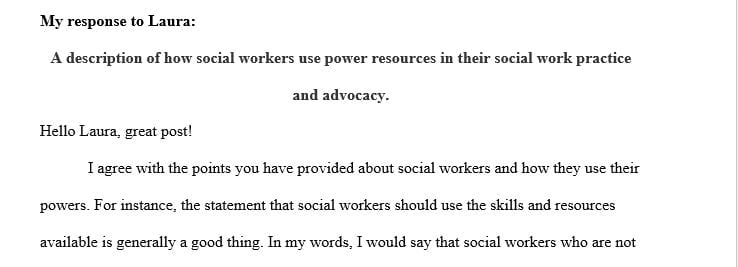A description of how social workers use power resources in their social work practice and advocacy.
Respond to a colleague who identified and selected a power resource different from the one you selected. Offer a supportive perspective to his or her choice. Include in your perspective some thoughts on how a social worker can manage the use of his or her power resource.
Be sure to use reference. (has to be different for each response)
DB1—
Laura—
A description of how social workers use power resources in their social work practice and advocacy.
Social workers should use the skills and resources available to them. Social workers are to advocate for the vulnerable and oppressed populations. Social workers need to relay this information to the public and politicians (Rocha, Poe, & Thomas, 2010, p. 318). Social workers may not be comfortable in the political arena. Social workers need to be knowledge about the social policy issue and convey the information in a concise and professional manner. Powers sometimes are used together. “These power resources develop from specific actions that policy advocates take during policy deliberations-often in response to the actions of other persons.” Jansson, B. S. (2018). Becoming an effective policy advocate: From policy practice to social justice (8th ed.), 340.
Type of power resource I would use in my practice and advocacy.
I would use process power. The policy is developed through give and take discussions. Characteristics of the process power are tenor, tempo, and scope of conflict. Process power involves the level of conflict, timing or length of time, and those who are involved in the process (Jansson, 2018, p. 344). After both sides decide their position, they must find a way to compromise and settle it. Those participating in the discussions can influence the amount of tension involved in the process (Jansson, 2018, p. 344). Timing may favor one side of the disputed proposal. The proposal needs to be introduced at the right time for a favorable outcome. Advocates may have limited influence and power to influence others to support their proposal. The other side may accelerate conflict (Jansson, 2018, p. 345).
Describe the ethical issues or concerns in using the type of power resource I selected.
The ethical issues would be confidentiality. Social workers must always maintain confidentiality. Social workers will be discussing the social issues and policy suggestion. According to National Association of Social Workers Code of Ethics, 2017, “Social workers should not discuss confidential information, electronically or in person, in any setting unless privacy can be ensured. Social workers should not discuss confidential information in public or semi-public areas such as hallways, waiting rooms, elevators, and restaurants.” 1.07i. As social workers advocate for a social policy change, they must be careful not to disclose their client’s information. The social worker may want to use case studies information for an example of the need for a policy change. Social workers must convey the information without breaching confidentiality.
References
https://www.socialworkers.org/About/Ethics/Code-of…
Jansson, B. S. (2018). Becoming an effective policy advocate: From policy practice to social justice (8th ed.). Pacific Grove, CA: Brooks/Cole Cengage Learning Series.
Rocha, C., Poe, B., & Thomas, V. (2010). Political Activities of Social Workers: Addressing Perceived Barriers to Political Participation. Social Work, 55(4), 317–325. https://doi-org.ezp.waldenulibrary.org/10.1093/sw/55.4.317
DB 2—
Rachael—
How do Social Workers use power resources in social work practice and advocacy?
Social workers use power resources in social work practice and advocacy in a variety of ways. These ways include policy maneuvering (use of substance to obtain policy approval), procedural power (use of procedure to obtain policy approval), process power (influencing the tenor/tempo/scope of discussions to obtain policy approval), and person to person power (direct interactions with policy approvers). Sub-categories of person to person power include expert, coercive, reward, referent, authority based, position based, information based, connection based, and value based (Jansson, 2018).
What type of power resources would I use in social work practice and advocacy?
The power resources that I would be most likely to use in my area for social work practice and advocacy is the person to person power, specifically the connection based method. This involves using personal and professional connections to key individuals in the policy making process (Jansson, 2018). I would use this method because I have worked in this area for a number of years and am well acquainted with the director of community services for both of my local counties, the director of mental health services for my local hospital, and various and assorted key figures in the local support organizations. Due to these connections, I would first bring my idea to them to gain support in order to ensure the policy makes it\’s way onto the appropriate political agendas.
Ethical issues and concerns of power resources chosen.
As with any use of power, there are ethical issues and considerations. For the use of the person to person power in general, and the connection based power specifically, these concerns include the possibility of manipulation, the unfairness and disadvantages for others without those connections in my area (Jansson, 2018), and the potential for nepotism and favoritism based on shared experiences. It is very important to be aware of those issues and concerns and ensure that all interactions are in compliance with the Social Work Ethical Guidelines.
References
Jansson, B. S. (2018). Becoming an effective policy advocate: From policy practice to social justice (8th ed.). Brooks/Cole Cengage Learning.
Requirements: 500 words
Answer preview to a description of how social workers use power resources in their social work practice and advocacy.
APA
729 words


